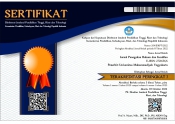Pencegahan Pelanggaran Tindak Pidana Pemilu melalui Pendaftaran dan Verifikasi Partai Politik Berdasarkan Undang-Undang Pemilu
DOI:
https://doi.org/10.18196/jphk.v5i1.19125Keywords:
Verification of political parties, General election crimes, 2024 general electionAbstract
After 24 years of reform, the people passionately anticipate direct general elections as a process of power transition and evaluation of the performance of political parties over the previous five years. Similarly, the registration and verification phases of political parties participating in the 2024 Election, which began on Friday, July 29, 2022, and ended on Tuesday, December 13, 2022, have concluded for the 2024 Election. The requirement for verification of political parties is an effort to improve the institutions of political parties to make them more professional in their management, as well as to verify the readiness and fulfillment of the requirements of political parties, both new and those that have participated in previous elections. In addition, if the registration and verification of political parties process proceeds smoothly, the subsequent stages will also go smoothly. One is to minimize or prevent violations of election criminal acts that can diminish the wisdom and efficiency of the 2024 Election process and stages. This study uses normative and empirical research methods and qualitative analysis to examine the relationship between the registration and verification of political parties and efforts to prevent election crime violations. This study demonstrates that verifying political party candidates can assist electors in selecting credible and competent public officials. However, verification provisions and procedures can increase the chance of election crimes and electoral misconduct. Therefore, the election commission (KPU) and Bawaslu must be resolute and unaffected by any interference that could harm the integrity of elections and democracy. The community is also responsible for supervising and providing aspirations so that election regulations do not diminish enthusiasm for conducting elections with integrity.
References
Asrinaldi. (2017). Partai Politik dan Keharusan Verifikasi: Membangun Tata Kelola Pemilu Serentak yang Berintegritas. Seminar Nasional Strategi Pembangunan Daerah Kepulauan. Tanjungpinang: Konferensi Perkumpulan Dekan Ilmu-Ilmu Sosial PTN Se-Indonesia.
Cho, Y., & Kim, Y. C. (2016). Procedural justice and perceived electoral integrity: the case of Korea’s 2012 presidential election. Democratization, 23(7), 1180–1197. https://doi.org/10.1080/13510347.2015.1063616
Coursey, D., & Norris, D. F. (2008). Models of E‐Government: Are They Correct? An Empirical Assessment. Public Administration Review, 68(3), 523–536. https://doi.org/10.1111/j.1540-6210.2008.00888.x
Fajar, M., & Achmad, Y. (2019). Dualisme Penelitian Hukum Empiris & Normatif. Yogyakarta: Pustaka Pelajar.
Harun, R. (2016). Rekonstruksi Kewenangan Penyelesaian Perselisihan Hasil Pemilihan Umum. Jurnal Konstitusi, 13(1). https://doi.org/10.31078/jk1311
Humas Sekretariat Kabinet. (2022). Pendaftaran, Verifikasi, dan Penetapan Partai Politik Peserta Pemilu Serentak Tahun 2024. Dikutip dari https://setkab.go.id/pendaftaran-verifikasi-dan-penetapan-partai-politik-peserta-pemilu-serentak-tahun-2024/
Lamintang, P. A., Lamintang, F. T., Ihsan, & Tarmizi. (2014). Dasar-Dasar Hukum Pidana di Indonesia (1st ed.). Jakarta: Sinar Grafika.
Lestari, Y. S. (2017). Kartel Politik dan Korupsi Politik di Indonesia. Pandecta Research Law Journal, 12(1), 67–75.
Muladi, & Arief, B. N. (1992). Teori-Teori dan Kebijakan Pidana (Cetakan 2). Bandung: Alumni.
Narbuko, C., & Achmadi, A. (2015). Metodologi Penelitian (Cetakan 14). Jakarta: Bumi Aksara.
Oktaryal, A., & Hastuti, P. (2021). Desain Penegakan Hukum Korupsi Partai Politik di Indonesia. Integritas: Jurnal Antikorupsi, 7(1), 1–22. https://doi.org/10.32697/integritas.v7i1.729
Putra, I. M., Ariany, R., & Syahrizal, S. (2019). Tata Kelola Verifikasi Partai Politik Peserta Pemilihan Umum Tahun 2019 di Komisi Pemilihan Umum Kota Padang. JISPO Jurnal Ilmu Sosial Dan Ilmu Politik, 9(1), 107–123.
Riani, Y., Junaidi, A., Tina, S. A., Jasika, M., & Melina, S. (2023). Sosialisasi Pelanggaran Politik dan Peran Masyarakat dalam Pengawasan Partisipatif Pemilu 2024. Jurnal Pengabdian Mandiri, 2(6), 1211–1218.
Santoso, T. (2006). Tindak Pidana Pemilu. Jakarta: Citra Aditya Bakti.
Setyo, H. J. (2016). Problematikan Penegakan Hukum Tindak Pidana Pemilu Legislatif di Indonesia (Tesis Magister, Indonesia Universitas Islam Indonesia, Yogyakarta, Indonesia). Universitas Islam Indonesia. Dikutip dari https://dspace.uii.ac.id/bitstream/handle/123456789/8875/RTP 111.pdf?sequence=1&isAllowed=y
Sulistiono, J. (2016). Penegakan Hukum Pidana Dalam Menanggulangi Tindak Pidana Pemilu (Studi Di Kota Pontianak). Jurnal Nestor Magister Hukum, 12(4).
Syafriandre, A., Zetra, A., & Amsari, F. (2019). Malapraktik dalam Proses Verifikasi Partai Politik di Indonesia: Studi Pada Pemilihan Umum 2019. Jurnal Wacana Politik, 4(1), 14–29.
Thr & Tim. (2022). Daftar 3 Nama Calon Presiden 2024 Pilihan Nasdem. Dikutip dari https://www.cnnindonesia.com/nasional/20220618065755-32-810497/daftar-3-nama-calon-presiden-2024-pilihan-nasdem
Waluyo, B. (2002). Penelitian Hukum Dalam Praktek (Cetakan 3). Jakarta: Sinar Grafika.
Peraturan Perundang-Undangan
Undang-undang Nomor 7 Tahun 2017 tentang Pemilihan Umum
Peraturan Komisi Pemilihan Umum Nomor 3 Tahun 2022 tentang Tahapan dan Jadwal Penyelenggaraan Pemilihan Umum 2024
Downloads
Additional Files
Published
Issue
Section
License
Copyright statementAuthors who publish with JURNAL PENEGAKAN HUKUM DAN KEADILAN agree to the following terms:
- Authors retain copyright and grant the journal right of first publication with the work simultaneously licensed under a Creative Commons Attribution License that allows others to share the work with an acknowledgement of the work's authorship and initial publication in this journal.
- Authors are able to enter into separate, additional contractual arrangements for the non-exclusive distribution of the journal's published version of the work (e.g., post it to an institutional repository or publish it in a book), with an acknowledgement of its initial publication in this journal.
- Authors are permitted and encouraged to post their work online (e.g., in institutional repositories or on their website) prior to and during the submission process, as it can lead to productive exchanges, as well as earlier and greater citation of published work (See The Effect of Open Access).
- Share — copy and redistribute the material in any medium or format
- Adapt — remix, transform, and build upon the material
- Attribution — You must give appropriate credit, provide a link to the license, and indicate if changes were made. You may do so in any reasonable manner, but not in any way that suggests the licensor endorses you or your use.
- NonCommercial — You may not use the material for commercial purposes.
- ShareAlike — If you remix, transform, or build upon the material, you must distribute your contributions under the same license as the original.
- No additional restrictions — You may not apply legal terms or technological measures that legally restrict others from doing anything the license permits.

JPHK is licensed under a Creative Commons Attribution-NonCommercial-ShareAlike 4.0 International License.

